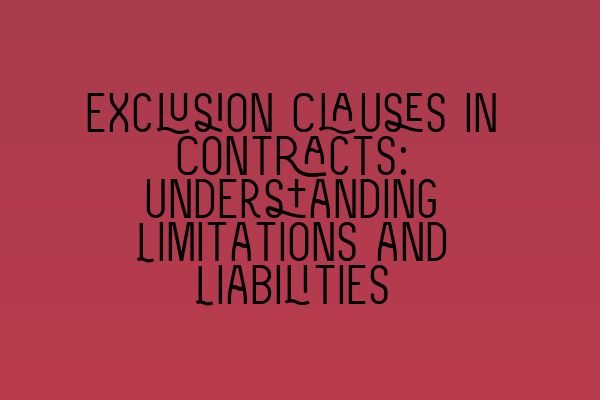Exclusion Clauses in Contracts: Understanding Limitations and Liabilities
Contracts are an integral part of business transactions, serving as a legal agreement between two or more parties. They outline the rights, obligations, and expectations of the parties involved and provide a framework for resolving disputes. However, no contract is perfect, and there may be instances where one party seeks to limit its liability or exclude certain obligations through the use of exclusion clauses.
In this article, we will explore the concept of exclusion clauses in contracts, their purpose, limitations, and potential liabilities. Understanding these provisions is essential for both parties to ensure a fair and well-balanced agreement.
What are Exclusion Clauses?
Exclusion clauses, also known as exemption clauses or limitation clauses, are contractual provisions that aim to restrict or exclude liability for certain events, breaches, or damages. These clauses allow parties to allocate risks and responsibilities between them and provide a level of protection in case of unforeseen circumstances.
Exclusion clauses can take different forms, such as disclaimers, waiver of rights, or exemption from liability. They are typically included in contracts to define the boundaries of responsibility and limit potential damage claims that can arise from breach of contract or other events.
Types of Exclusion Clauses
There are several types of exclusion clauses commonly used in contracts. These include:
- Exclusion of Liability: These clauses seek to limit or exclude liability for certain types of losses or damages.
- Indemnity Clauses: Indemnity clauses require one party to compensate the other for specified losses or damages.
- Time Limitation Clauses: These clauses impose time limits on when a party can bring a claim.
- Non-Reliance Clauses: Non-reliance clauses are used to prevent one party from relying on statements or representations made by the other party.
Each type of exclusion clause serves a specific purpose and carries its own set of limitations and implications. It is crucial to understand these factors to ensure the validity and enforceability of the clause.
Limitations and Liabilities
While exclusion clauses can provide parties with protections, they are subject to certain limitations and liabilities. It is important to be aware of these considerations to avoid potential disputes or unenforceable provisions.
1. Unfair Contract Terms: Exclusion clauses are subject to legislation such as the Unfair Contract Terms Act 1977 and the Consumer Rights Act 2015. These laws aim to protect parties, particularly consumers, from unfair contractual provisions that unreasonably limit their rights and remedies.
2. Interpretation: Courts will carefully scrutinize exclusion clauses to determine their meaning and intent. Ambiguous or unclear clauses may be interpreted against the party seeking to rely on them. It is crucial to ensure that exclusion clauses are clearly drafted and unambiguous to avoid any confusion or disputes.
3. Unreasonable Exclusions: Exclusion clauses that attempt to exclude liability for death or personal injury caused by negligence are generally considered unreasonable and may be void. It is important to consult legal professionals when incorporating exclusion clauses to ensure that they are reasonable and enforceable.
4. Notice Requirements: Valid exclusion clauses often require reasonable notice. This means that the other party must have had a reasonable opportunity to read and understand the clause before entering into the contract. Including the clause in a conspicuous manner and drawing attention to its presence can help meet notice requirements.
5. Fundamental Breach: A party cannot generally exclude liability for a fundamental breach of contract. A fundamental breach goes to the heart of the contract and undermines its purpose or value. Courts are unlikely to enforce exclusion clauses that seek to exempt liability for such breaches.
It is advisable to seek legal advice when drafting or reviewing exclusion clauses to ensure compliance with applicable laws and avoid potential pitfalls.
Conclusion
Exclusion clauses play a crucial role in defining contractual relationships and allocating risks between parties. However, they require careful drafting and consideration to be enforceable and avoid being deemed unfair or unreasonable. Understanding the limitations and potential liabilities associated with exclusion clauses is essential for both contractors and contractees to ensure a balanced and fair agreement.
To delve deeper into contract law and related topics, you may find the following articles helpful:
- Interpreting Contractual Clauses: Unlocking the Hidden Meanings
- Agreements in Contract Law: Understanding Its Various Types
- Essentials of Consideration: Understanding the Basis of Contractual Exchange
- Contract Law Tutorials: Simplifying Complex Concepts for Students
- Discharge of Contracts: Modes and Consequences Explained
By gaining a comprehensive understanding of contract law principles and related topics, individuals and businesses can navigate contracts and contractual disputes with confidence.
